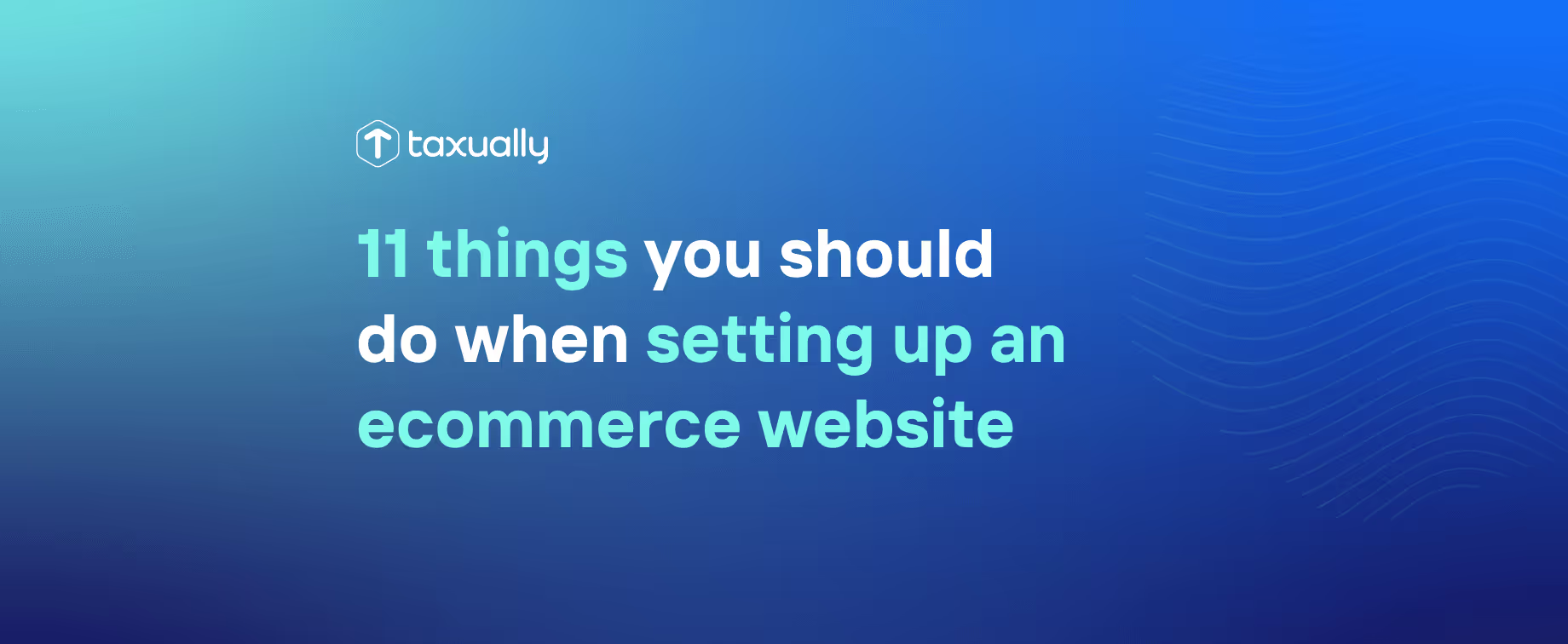Key takeaways
- Plan before you launch: Define your niche, target audience, and business plan to create a strong foundation for your ecommerce store.
- Build a seamless shopping experience: Choose the right platform, design a user-friendly website, and use secure payment gateways to boost customer trust.
- Grow with strategy: Optimize your site for SEO, market your products effectively, and track performance to keep improving and driving sales.
Starting an ecommerce business can be both exciting and overwhelming. There are so many things to consider, from selecting the right products to creating a user-friendly ecommerce website, it can be difficult to know where to start. With that in mind, the Taxually team has put together an essential checklist of eleven ecommerce tips that will help get your online business up and running successfully.
1. Identify your niche and target audience
Before launching your ecommerce store, before you even begin designing your website, it’s crucial to define your business niche and identify your target audience. Think about the products/services you’ll be offering and how your business can stand out from the rest. Conduct market research to get a better idea of your target audience, their needs, wants, and pain points.
2. Create an ecommerce business plan
Once you’ve figured out the fundamentals of your business such as the kind of products you’ll be selling, it’s time to develop a business plan. An ecommerce business plan is critical for mapping out your goals and strategies. It should include an executive summary, market analysis, marketing and sales strategies, financial projections, and more.
3. Choose an ecommerce platform
There are many ecommerce platforms to choose from, including Shopify, WooCommerce, and BigCommerce, and selecting the right ecommerce platform will be crucial for your business's success. Each platform has its own strengths and weaknesses, so it’s important to do your research first and choose the one that best suits your needs and budget.
4. Develop a brand identity
A recognizable brand allows you to build relationships with your customers, fostering long-term connections and customer loyalty. Your brand identity includes your logo, color scheme, tone of voice, and overall aesthetic. It should be consistent across all aspects of your website and marketing efforts to create a cohesive and identifiable brand.
5. Choose an ecommerce payment gateway
An essential part of your ecommerce store will be the payment gateway, which allows customers to make purchases on your website using their preferred method of payment. Select a secure payment gateway that accepts various payment methods. Some popular options for ecommerce payments include PayPal, Stripe, and Square.
6. Design your ecommerce website
Your ecommerce website should be visually appealing, easy to navigate, and mobile-friendly. Include high-quality product images (they should be well-lit, properly cropped, and showcase your products from multiple angles), descriptions, and reviews to enhance the user experience. It’s also important to include clear calls-to-action to encourage customers to place orders.
7. Write compelling product descriptions
Make sure your product descriptions are informative, engaging, and highlight the unique features and benefits of those products. Use descriptive language and address any potential concerns or questions customers may have.
8. Create a shipping and fulfillment strategy
Develop a shipping and fulfillment strategy to ensure timely delivery and customer satisfaction. This will mean deciding whether to handle the entire ecommerce order fulfillment process yourself or use a fulfillment service. Many ecommerce businesses opt to use Fulfilled by Amazon or a dropshipping supplier such as Spocket or AliExpress.
9. Develop an ecommerce marketing strategy
Creating an ecommerce marketing strategy is critical for reaching your target audience and driving sales. Without it, it’s unlikely potential customers will find your products. Consider using social media, email marketing, and paid advertising to promote your products and brand.
10. Optimize your website for SEO
Search engine optimization (SEO) is crucial for driving organic traffic to your website. Optimize your website with relevant keywords, meta descriptions, and alt tags to improve your search engine rankings.
11. Monitor your business's performance
Regularly monitoring your business's performance is critical for identifying areas of improvement and making data-driven decisions. Utilize analytics tools to track website traffic, conversion rates, and sales data.
If you’ve recently set up your own ecommerce business or are thinking about it, let Taxually take care of all your VAT compliance obligations. Email us at mycompliance@taxually.com and we’ll arrange a free call with one of our VAT experts.
Frequently asked questions
New Year's Day - 1/1/2024Memorial Day - 5/27/20244th of July - 7/4/2024Labor Day - 9/2/2024Thanksgiving Day - 11/28/2024Day after Thanksgiving - 11/29/2024Christmas Eve - 12/24/2024Christmas Day - 12/25/2024
How do I start an ecommerce business?
Start by identifying your niche and target audience, then create a solid ecommerce business plan. Once you’ve chosen your platform, designed your website, and set up payment gateways, you can focus on marketing and fulfillment to grow your online store.
Which ecommerce platform is best for beginners?
Popular ecommerce platforms like Shopify, WooCommerce, and BigCommerce each have their advantages. Shopify is great for ease of use, WooCommerce works well with WordPress, and BigCommerce offers advanced scalability for growing businesses.
How can I make my ecommerce website successful?
A successful ecommerce website should be visually appealing, easy to navigate, and optimized for SEO. Use high-quality product photos, engaging descriptions, and clear calls to action to increase conversions and customer trust.
What payment gateways are best for ecommerce stores?
The most reliable ecommerce payment gateways include Stripe, PayPal, and Square. These options are secure, widely used, and support multiple payment methods, making it easy for customers to complete purchases.
Why is SEO important for ecommerce websites?
SEO helps your ecommerce site rank higher in search results, driving more organic traffic and potential customers. Optimize your site with relevant keywords, meta descriptions, and alt tags to improve visibility and boost sales.



















